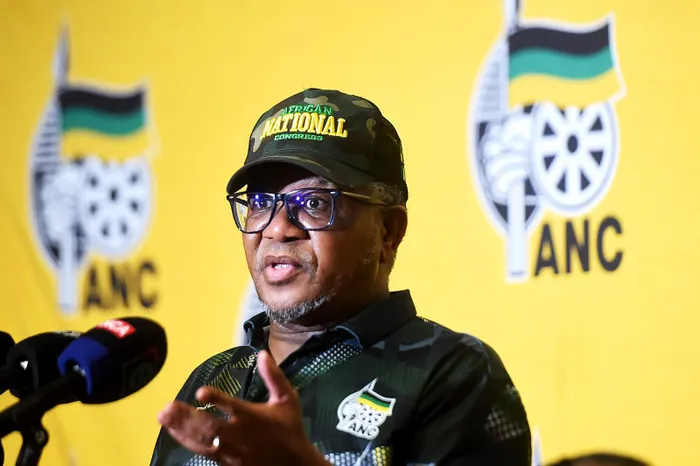
The ANC secretary-general Fikile Mbalula’s public statement that the party is being infiltrated by criminal cartels has sparked concerns about the party's future and its performance in the upcoming 2026 municipal polls.
Image: Itumeleng English/ Independent Newspapers
The ANC's admission of being infiltrated by criminal cartels, as pronounced by its secretary-general Fikile Mbalula, has raised concerns about the party's future, including performance in the upcoming 2026 municipal polls.
Mbalula’s utterance was made during a media briefing on Thursday in Joburg where he said that “our organisation is infiltrated by criminal elements and it extends to cartels”.
He was addressing questions regarding the actions by North-West businessman Brown Mogotsi, an alleged associate of Police Minister Senzo Mchunu, who has been accused of siphoning money from businessman Vusimuzi “Cat” Matlala to bankroll the ANC’s activities.
During his testimony at the ongoing Madlanga Judicial Commission of Inquiry, SAPS crime intelligence boss Lieutenant General Dumisani Khumalo testified that Mogotsi used Matlala's funds to cover expenses for ANC members during this year’s January 8 statement celebrations in the Western Cape.
Mogotsi also allegedly leaked SAPS’s classified documents to Matlala, while receiving payments tied to ANC events linked to Mchunu's supporters. He was also found to have a letter penned by Mchunu ordering the Political Killings Task Team's disbandment on December 31, 2024.
Roland Henwood, University of Pretoria political scientist, believes that this revelation is not exactly news, given the party's history of battling internal corruption and external pressures.
“Yes, the statement may impact the performance of the party during 2026 local government elections but what he said is not news to us,” he said.
He criticised Mbalula's statement, saying it shifts the blame to external factors rather than acknowledging the party's internal issues.
"What he is saying is that something from the outside infiltrated us and what he is not saying is that we did it to ourselves," he said.
Henwood believes that the ANC's problems stem from within, specifically from key leaders and members prioritising their self-interest.
He dismissed the idea that the ANC can self-correct, calling it hollow rhetoric without tangible results.
"Show us the results," he demanded, pointing to the disarray in Gauteng's local government, where the ANC is in charge.
He also questioned the party's ability to regain public trust, given Mbalula's admission.
"How can you trust somebody who says we acknowledge we are criminals and does nothing about it?" he asked.
The Madlanga Commission is probing allegations of criminality, political interference and corruption within South Africa's criminal justice system.
Mbalula distanced the ANC from Mogotsi, stating that if he is indeed involved in siphoning money in the party's name, he represents a bad ANC member.
He added that Mogotsi's membership has expired and he is no longer an ANC member.
“There are many such characters who have infiltrated the ANC. You can ask yourself, the person who is so low in the ANC: how does he have control and be accused of bigger things than what we are reading? That tells you a story that the ANC is infiltrated as a party,” he said.
Zakes Moabelo, an independent political analyst, said Mbalula's statement about the ANC being infiltrated by criminal cartels is accurate, but comes way too late.
"They woke up too late. Remember there were certain matters that (the party previosuly) did not allow, including using money to lobby, (but now this has) become a trend,” he said.
He believes that many ANC cadres prioritise their personal interests over the party's well-being.
"They love themselves more than the organisation," he said.
Moabelo said the ANC's self-criticism is not something new, saying it is a recurring theme at every party conference.
For example, he said, at the Polokwane conference in 2017, former ANC President Thabo Mbeki and former secretary-general Kgalema Motlanthe both raised concerns about the party's direction.
Moabelo said: "Mbeki asked ‘Where is the ANC? Where is the soul of the ANC?’ At the same conference Motlanthe asked whether the party was being bought by money. But the cadres there failed to answer that question because they were too excited at that moment that they were winning, forgetting that winning without principle will always be short-lived.”
According to him, Mbalula's statement is unlikely to restore public trust in the party.
“You can not save a drowning person otherwise you will drown with them. At the moment they (ANC) don’t have strong characters who can resuscitate the party,” he said.
Critical of the non-binding nature of the commissions’ recommendations, Professor Sipho Seepe recently pointed out that the ANC's history of failing to act on commission recommendations, such as those concerning Gwede Mantashe and Zizi Kodwa (at the Zondo inquiry), supports his concerns.
Despite the Zondo Commission's damning findings, he said, these individuals were promoted to ministerial positions, illustrating the party's priorities.
He highlighted that former Chief Justice Raymond Zondo publicly expressed frustration over the lack of action taken on his commission's recommendations.
rapula.moatshe@inl.co.za